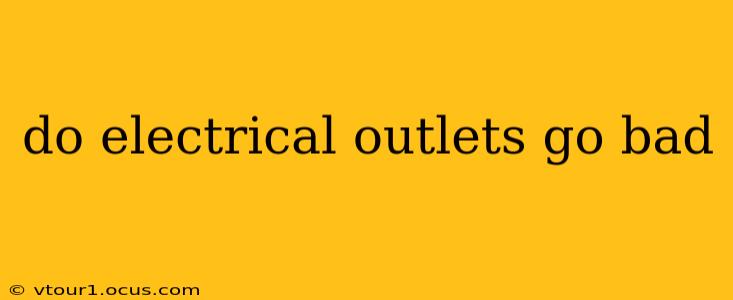Electrical outlets, those ubiquitous fixtures in our homes and offices, are often taken for granted until they stop working. The simple answer is yes, electrical outlets can absolutely go bad, and understanding why is crucial for both safety and convenience. This comprehensive guide explores the reasons behind malfunctioning outlets, the telltale signs of a problem, and how to address them.
Why Do Electrical Outlets Fail?
Several factors can contribute to an electrical outlet's demise. Let's explore some of the most common causes:
-
Loose Wiring: This is perhaps the most frequent culprit. Over time, vibrations, movement of furniture, or even just the constant expansion and contraction of materials due to temperature changes can loosen the wires connected to the outlet. A loose connection leads to intermittent power or a complete lack of power.
-
Overloaded Circuits: Plugging too many high-wattage appliances into a single circuit can overload it, generating excessive heat. This heat can damage the outlet itself, causing it to malfunction or even pose a fire hazard. This isn't necessarily a failure of the outlet itself but rather a consequence of misuse.
-
Worn-Out Components: Outlets, like any electrical component, have a finite lifespan. The internal components can wear down over years of use, leading to a gradual decrease in their efficiency and eventual failure. This is especially true in high-traffic areas or those exposed to extreme temperatures or humidity.
-
Water Damage: Exposure to moisture is a significant threat to electrical outlets. Spilled liquids, leaks, or even high humidity can corrode the internal components, leading to short circuits, electrical shocks, and ultimately, outlet failure.
-
Physical Damage: Accidental impacts, such as dropping heavy objects or hammering into a wall, can easily damage an outlet. Internal components can be broken, leading to immediate or eventual malfunction.
-
Faulty GFCI Outlets: Ground Fault Circuit Interrupters (GFCIs) are designed to protect against electrical shocks. While a vital safety feature, GFCIs can also fail, requiring replacement. A tripped GFCI that won't reset is a clear sign of a problem.
How Can I Tell if My Electrical Outlet is Bad?
Identifying a faulty outlet involves a combination of observation and testing. Here are some key indicators:
-
No Power: The most obvious sign is a complete lack of power at the outlet. Try plugging in different devices to rule out problems with the appliance.
-
Intermittent Power: Power flickering on and off suggests a loose connection within the outlet or its wiring.
-
Warm or Hot Outlet: An unusually warm or hot outlet indicates an overload or a serious internal problem. This is a major safety concern and demands immediate attention.
-
Burning Smell: A burning smell emanating from an outlet is a critical warning sign and requires immediate disconnection of the outlet and professional assessment.
-
Tripped GFCI: If you have a GFCI outlet and it keeps tripping, even when nothing is plugged in, the GFCI itself might be faulty and require replacement.
What Should I Do if My Outlet is Bad?
If you suspect a faulty outlet, do not attempt to repair it yourself unless you are a qualified electrician. Working with electricity can be dangerous, and improper repairs can lead to electrical shocks, fires, or further damage. Here's what you should do:
-
Turn off the power: Locate your circuit breaker box and turn off the breaker controlling the affected circuit.
-
Call an electrician: A qualified electrician has the expertise and safety equipment to diagnose and repair the problem safely and efficiently.
Frequently Asked Questions (FAQs)
How much does it cost to replace an electrical outlet?
The cost of replacing an electrical outlet varies depending on location, the electrician's rates, and the complexity of the job. However, it's generally a relatively inexpensive repair.
Can I replace a faulty outlet myself?
While some DIY enthusiasts might attempt this, it's strongly discouraged unless you possess extensive electrical knowledge and experience. Incorrect wiring can lead to serious safety hazards.
How often should electrical outlets be checked?
Regular inspections are advisable, particularly after any event that could damage wiring, such as renovations or severe weather. A visual inspection for loose wires, damage, or overheating is sufficient for most homeowners.
What are the signs of a faulty electrical system?
Faulty outlets are just one sign. Other indicators of a broader electrical problem include frequently tripping breakers, flickering lights, burning smells, and warm or hot wiring.
By understanding the causes and recognizing the signs of a faulty electrical outlet, you can proactively address potential problems and ensure the safety and functionality of your electrical system. Remember, safety should always be your top priority. If you are unsure about anything, always contact a qualified electrician.
